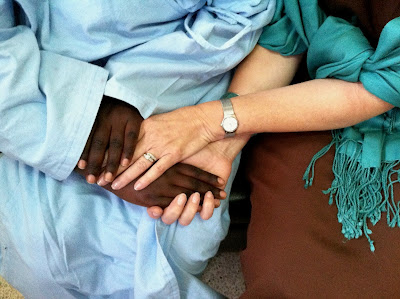Living Out the Narrative
 |
| A partnership (SAI) working with victims of Gender Based Violence in Kenya. |
Scripture
Phil. 2:10 so that at the name of Jesus
every knee should bend,
in heaven and on earth and under the earth,
11 and every tongue should confess
that Jesus Christ is Lord,
to the glory of God the Father.
Observation
The ending to this hymn is powerful, where there is recognition that the one that the Romans humiliated and crucified is then declared to be ruler over all. The work of Jesus Christ challenges the Roman empire’s understanding of how to obtain power and rule the world. Yet, here we are, 2000 years later and the Roman empire no longer exists, but Jesus is Lord.
The purpose of this Christological hymn is to draw the Philippian church into the narrative of Jesus’ life. The divisions in the church were painful to Paul, and he knew that the only way there could be healing would be through participation with Christ. However, he also believed in defining the reality, and therefore they didn’t need to be presented with sugar-coated notions of who Christ was, what he did, or what was expected of them. Paul was calling the people to live out the narrative found in the entire life of Christ.
Application
This passage has presented us with a vision of holiness that is entirely Christo-centric. John Wesley believed that Christian holiness meant, “having all the mind which was in Christ, enabling us to walk as Christ walked.… loving God with all our heart, and our neighbour as ourselves” (1979, 11:444) (Flemming, NBBC). Simply put, to follow after Christ means that we are clothed in his nature and we respond to the world in the way that Jesus did.
I have been challenged by this entire passage as it has called into question the way in which I am to follow Christ. Living out his narrative is not something that happens in an instant, but becomes part of the life-long journey in faith. The source of that journey, as mentioned by John Wesley, must come from loving God with all our heart. That is only possible through a day by day, on-going and continuous journey with the Lord. Just as our own personal human relationships cannot be neglected and expected to thrive, nor can our relationship with God. The more that we participate in the holy love of God, the more our hearts are permeated with that love. Ultimately, this leads to an overflow of love to our neighbor.
The ways in which we love others is a direct reflection upon our love for God. Jesus is the role-model for us. If Jesus gave up what he had so that he could serve others, then we are to do the same. Dean Flemming puts it this way, "The portrait of Christlikeness we find here is relational and community-oriented. It is the picture of a Christ who ‘made himself nothing’ for others mirrored in a community that is called to embody his self-giving love toward one another. To the extent that sin is self-centeredness, holiness as Christlikeness is surely ‘other-centeredness’ (Staples 1993, 217). Holiness means Christlike self-emptying; it involves living out the narrative of Christ on our streets.” (Flemming, NBBC)
The way of Jesus never was the way of the Roman empire. It didn’t make sense to people then, and it may not make sense to us now, but nevertheless, I pray that we will have the mind of Christ and in doing so, we will live the life of ‘other-centered’ Christlike holiness.
Prayer
Lord, search my heart and help me to be filled with your love. Amen.
Comments
Post a Comment